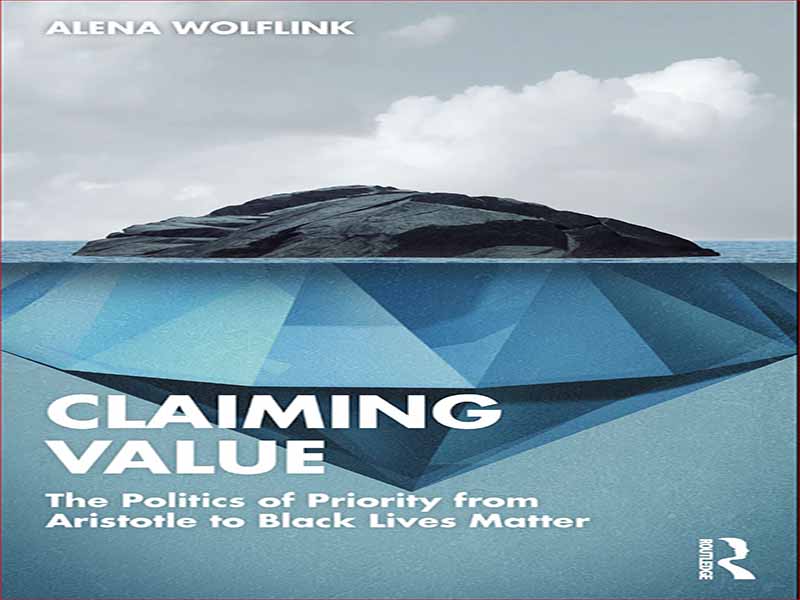- عنوان کتاب: Claiming Value/The Politics of Priority from Aristotle to Black Lives Matter
- نویسنده/انتشارات: Alena Wolfink
- حوزه: ارزش پایدار
- سال انتشار: 2023
- تعداد صفحه: 181
- زبان اصلی: انگلیسی
- نوع فایل: pdf
- حجم فایل: 3.98 مگابایت
تصور کنید صندوق پستی خود را باز کنید و یک «پیشنهاد ویژه برای مشتریان ارزشمند» پیدا کنید. تا حدودی میدانید که پیشنهاد دعوت مبنی بر «ارزشمند شدن» شما فریبنده است. یک بدبین درونی به شما یادآوری میکند که برای شرکت از نظر الگوریتمی بهعنوان یک مصرفکننده گاه به گاه ظاهر شدهاید که احتمالاً در پاسخ به درخواستهای شخصیشده، وفاداری به برند را ایجاد میکنید. میدانید که فرستنده به رفاه، کیفیت زندگی، امیدها و رویاهای شما اهمیتی نمیدهد، یا حتی دعوت را ذخیره میکنید یا فوراً آن را کنار میگذارید. با این وجود، چیزی صادقانه و صریح در مورد نامه روی پستکننده وجود دارد – کسانی که آن را ارسال کردهاند برای شما ارزش قائل هستند. آنها یک نقطه قیمت برای کالاهای خود تعیین کردهاند، احتمال مصرف مداوم شما را در نظر گرفتهاند – چه با یک ضربه اضافی و چه بدون آن – و شما را ارزش هزینههای پردازش پستهای هدفمند میدانند. از این نظر شما در واقع توسط این شرکت ارزش گذاری شده اید و احتمالاً ارزش هزینه ای در حدود 0.13 دلار در مواد چاپی را دارید. این انتخاب کلمه، با ارزش، به نوعی هنوز در سطح عمیق تری طنین انداز است. این به چیزی شخصی تر از یک معامله پولی اشاره دارد. معانی “ارزشمند” بیش از اعلان صریح است که سودآوری شما تخمین زده می شود. آنها همچنین پیام هایی مانند “شما برای ما مهم هستید” و “ما به شما اهمیت می دهیم” را منتقل می کنند. با این حال، هر چقدر این ایمیلکننده ممکن است تلاش کنید، نمیتواند شما را متقاعد کند که شرکتش همانطور که پدربزرگ و مادربزرگ یا بهترین دوستتان برای شما ارزش قائل است، برای شما ارزش قائل است. مفهوم ارزش در زبان ما فراگیر است. این شرط اساسی نظریه اقتصادی و هنجاری است. این کلمه برای توصیف همه چیز از اعتقادات فردی گرفته تا قدرت یک ارز استفاده می شود. اقتصاد و توسعه اقتصادی در زنجیرههای طولانی فرآیندهای «ارزشافزودن» تجسم میشوند و فروش «ارزش عالی» را با قیمتهای پایین تبلیغ میکند. ما اغلب ارزش را به عنوان چیزی که برای مصرف کننده «اضافه می شود» مورد بحث قرار می دهیم، اما وقتی از «ارزش ها» صحبت می کنیم، می گوییم (یا امیدواریم) که همان ارزش ها را به اشتراک می گذاریم. سپس نگران «تضاد ارزشها» هستیم و برای دفاع از ارزشهای آمریکایی، ارزشهای مسیحی و حتی گاهی اوقات ارزشهای دموکراتیک بسیج میشویم. بخشی از آنچه در این کاربردهای متنوع از گفتمان ارزشی در خطر است، یک ابهام در قلب این مفهوم است. اصطلاح «ارزش» به طرز گیجآمیزی هم در قلمرو هنجارهای فرهنگی، اخلاقیات، و درک «خوب» و هم از توصیفهای ظاهراً خنثی از مکانیسمهای قیمتها و معاملات سهیم است. 1 ادعاهای مربوط به ارزش قطعاً میتوانند در خدمت اهداف ما باشند. نگرانیهای اصلی، توضیح انگیزهها، یا توجیه اقدامات – نشان دادن آنچه که به آن اهمیت میدهیم و آنچه برای ما مهم است. با این حال، همانطور که مثال ارسال کننده نشان می دهد، تقطیر یک پیام به اهمیت به تنهایی در واقع محتوای سیاسی ادعاهای ارزشی را کمرنگ می کند. به هر حال، انواع مختلفی از ارزش وجود دارد، و مراقبتها و نگرانیها همیشه با فرآیندهای مادی عمیقتر اولویتبندی همراه نیستند. به عنوان مثال، شخص میتواند انواع خاصی از ارزشگذاری را بدون انواع دیگر دریافت کند. بسیاری از سلسله مراتب ظاهراً خیرخواه دقیقاً این ویژگی را دارند – آنهایی که قدرت دارند نوعی مراقبت از افراد پایین تر از خود را ارائه می دهند، اما نه احترام یا رفتار متقابلی که نشان دهد هر دو طرف از بسیاری از جهات مهم ارزش یکسانی دارند. مفهوم ارزش در نتیجه مرزهای ناپایدار بین نیازها و خواسته های انسان و درهم تنیدگی ما با یکدیگر را آشکار می کند.
Imagine opening your mailbox and fnding a “Special Ofer for Valued Customers.” On some level you know that the invitation’s suggestion that you are “valued” is deceitful. An inner cynic reminds you that to the company you have been algorithmically fagged as an occasional consumer likely to develop brand loyalty in response to personalized solicitations. You know that the sender does not care about your prosperity, quality of life, hopes and dreams, or even whether you save the invitation or immediately cast it aside.
There is nevertheless something honest and frank about the lettering on the mailer—those who sent it do value you. They have determined a price point for their goods, considered the likelihood of your continued consumption—both with and without an additional nudge—and deemed you worth the processing costs of targeted mailing. In this sense you have in fact been valued by this company, and likely estimated to be worth an expenditure of about $0.13 in printing materials.
This choice of word, valued, somehow still resonates on a deeper level. It implies something more personal than a monetary transaction. The connotations of ‘valued’ exceed the frank notifcation that you are being estimated for your proftability; they also convey messages like “you are important to us,” and “we care about you.” Still, try as this mailer might, it cannot convince you that its company values you in the same way that your grandparent or best friend values you.
The concept of value is pervasive in our language. It is the sine qua non of economic and normative theory alike. The word is used to describe everything from individual convictions to the power of a currency. Economies and economic development are visualized in long chains of “value-adding” processes, and sales advertise “great value” at low prices. We often discuss value as something that is “added” for the consumer, but when we speak of ‘values’ we say (or we hope) that we share the same ones. We then worry about “clashes of values,” and proceed to mobilize in defense of American values, Christian values, and occasionally even democratic values.
Part of what is at stake in these diverse uses of value discourse is an ambiguity at the heart of this concept. The term ‘value’ perplexingly partakes of both the realm of cultural norms, morality, and understandings of the “good,” and of ostensibly neutral descriptions of the mechanisms of prices and transactions.1 Claims about value can certainly serve the purposes of fagging our principal concerns, explaining motivations, or justifying actions—of signaling what we care about, and what is important to us. However, as the example of the mailer shows, distilling a message to importance alone actually dilutes the political content of value claims. There are, after all, a number of types of value, and cares and concerns are not always accompanied by deeper material processes of prioritization. For instance, one can receive a bounty of certain types of valuation absent other types. Many purportedly benevolent hierarchies have precisely this quality—those with power provide a form of care to those below them, but not the respect or reciprocity that would demonstrate both parties being equally valued in many of the ways that matter. The concept of value thereby exposes unstable boundaries between human needs and desires, and our entanglements with one another.
این کتاب را میتوانید از لینک زیر بصورت رایگان دانلود کنید:
Download: Claiming Value/The Politics of Priority from Aristotle to Black Lives Matter





































نظرات کاربران